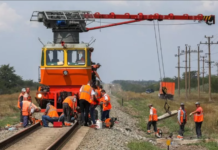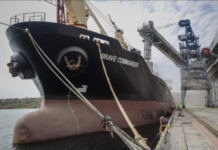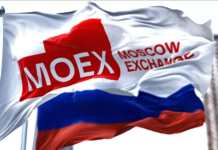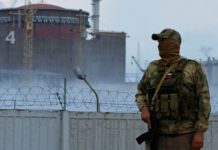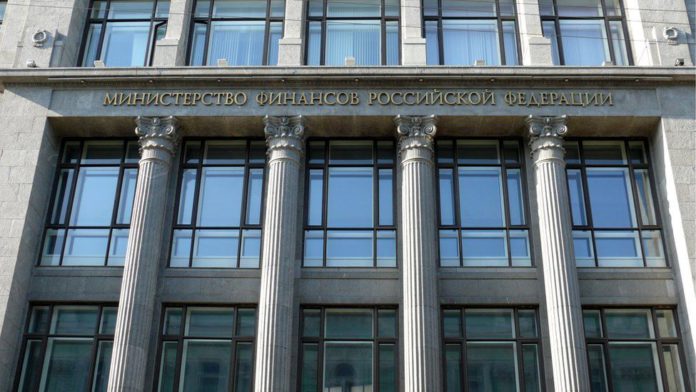
Russia has defaulted on its overseas debt for the first time in more than a century after missing a Sunday deadline, reports suggest.
Russia has the money to make a $100m (£81.4m) payment and is willing to pay, but sanctions made it impossible to get the sum to international creditors.
The Kremlin had been determined to avoid the default, which is a major blow to the nation’s prestige.
The Russian finance minister branded the situation “a farce”.
The $100m interest payment was due on 27 May. Russia says the money was sent to Euroclear, a bank which would then distribute the payment to investors.
But that payment has been stuck there, according to Bloomberg News, and creditors have not received it.
Meanwhile, some Taiwanese holders of Russian bonds denominated in euros have not received interest payments, according to the Reuters news agency, which cited two sources.
The money had not arrived within 30 days of the due date, that is, Sunday evening, and so is considered a default.
Euroclear would not say if the payment had been blocked, but said it adhered to all sanctions, introduced following Russia’s invasion of Ukraine.
Although default is a symbolic blow, it will have few immediate practical consequences for Russia.
READ ALSO
Defaulting nations usually find it impossible to borrow any more money, but Russia is already in effect barred from borrowing in Western markets by sanctions.
In any case, it is reportedly earning about $1bn a day from fossil fuel exports, and Russian Finance Minister Anton Siluanov said in April the country had no plans to borrow more.
The default will trigger repayments on a large chunk of Russia’s debt, according to Chris Weafer, former chief strategist at Russia largest bank Sberbank-CIB and chief executive at Moscow-based consultancy Macro Advisory.
“Some parts of that debt will now become automatically due because there will be early repayment clauses in all debt instruments so if you default on one it usually triggers the immediate demand for payment on the other debts, so Russia could certainly face immediate debt repayment of about $20bn at this stage,” he told the BBC’s Today programme.
The last time Russia defaulted on its foreign debt was in 1918, during the Bolshevik Revolution when the new communist leader Vladimir Lenin refused to pay the debts of the Russian Empire.
Russia’s last debt default of any kind was in 1998 as the country was rocked by the rouble crisis during the chaotic end of Boris Yeltsin’s regime. At the time Moscow failed to keep up payments on its domestic bonds but managed not to default on its overseas debt.
Russia has seemed on an inevitable path to default since sanctions were first imposed by the US and European Union following the invasion of Ukraine.
These restricted the country’s access to the international banking networks which would process payments from Russia to investors around the world.
Mr Weafer said that while the default would have no short or medium-term impact on Russia, because it is reaping revenue from selling high-priced commodities such as oil, it would create a “legacy” problem if the situation with Ukraine and the resultant sanctions improves.
“This is the sort of action that will hang over the economy and make recovery much more difficult when we get to that stage,” he said.
Takahide Kiuchi, executive economist at the Nomura Research Institute, told the BBC he did not expect a default to have a major impact on the global markets because investors had been expecting it.
However, he believes the combination of a foreign debt default and international sanctions will have a severe effect on Russia’s economy.
“In the short-term the Russian economy is expected to go into recession, contracting by around 10% this year,” Mr Kiuchi said.
“Looking further forward, the country will struggle to grow its economy as it may not be able to borrow money from overseas for decades, possibly up to 30 years.”
- Russia’s economy in for a bumpy ride as sanctions bite
- What sanctions are being imposed on Russia over Ukraine invasion?
The Russian government has said it wants to make all of its payments on time, and up until now it had succeeded.
About $40bn of Russia’s debts are denominated in dollars or euros, with around half held outside the country.
Default seemed inevitable when the US Treasury decided not to renew the special exemption in sanctions rules allowing investors to receive interest payments from Russia, which expired on 25 May.
The Kremlin now appears to have accepted this inevitability too, decreeing on 23 June stating that all future debt payments would be made in roubles through a Russian bank, the National Settlements Depository, even when contracts state they should be in dollars or other international currencies.
Mr Siluanov admitted foreign investors would “not be able to receive” the payments, according to the RIA Novosti news agency.
Because Russia wants to pay and has plenty of money to do it, he denied that this amounts to a genuine default, which usually occur when governments refuse to pay, or their economies are so weak that they cannot find the money.
“Everyone in the know understands that this is not a default at all,” RIA Novosti quoted him. “This whole situation looks like a farce.”
Meanwhile, Mr Weafer, who is based in Moscow, said that life was more or less operating as normal despite sanctions and Western companies withdrawing from Russia.
“If you’re in Moscow right now frankly, if you weren’t reading the newspapers, you’d see there’s been a price increase but otherwise life is as it was before February 24.
“In March and April there was a lot of concern that products would disappear, that factories would not be able to get components or materials to continue operating and we could be looking therefore at a severe drop in employment or a rise in unemployment by the summer [or] early autumn. That situation has improved,” he added.
“We’ve seen alternative import routes opening via Kazakhstan and Turkey, the government has promoted what they call a parallel import scheme so effectively a lot of products that were blocked in March and April are now starting to reappear, albeit at a higher price.”

